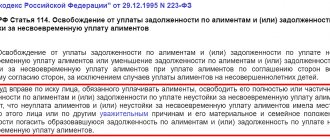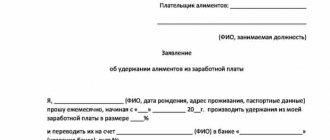According to Russian legislation, father and mother have equal rights regarding the upbringing and maintenance of the child. However, in practice it happens that after separation one of the parents stops not only communicating, but also financially helping the other party. The situation may become more complicated if the father is a resident of another country. This is due to the fact that the collection of alimony from a foreign citizen is regulated by the norms of international family law and differs from the procedure when a woman demands financial support from her compatriot.
Priority aspects: what you need to know
The legal process of involving a foreigner in the maintenance of a child has certain difficulties, because it is regulated not only by Russian legislation itself, but also by the regulations of the country from which the man arrived. In addition, the provisions of international law come into play.
A woman can hope to establish alimony legal relations only if she proves that the father of her child is this particular citizen and no one else. It's confirmed:
- marriage registration certificate indicating the fact of the union;
- the child’s birth certificate, which contains information about the father;
- in the absence of a registered relationship - a certificate of paternity.
A woman needs to make sure that information about the person she wants to involve in the financial support of her child is present in at least one of the above documents. Otherwise, the mother simply will not be able to collect alimony from the father. Even if the man is a direct biological relative of the minor, in the absence of factual evidence and records in official papers, this relationship has no legal force.
If it is impossible to provide a marriage registration certificate and/or a child’s birth certificate indicating information about the father, the woman will only have to initiate the procedure to determine paternity. However, for this it is necessary that the man be on the territory of the Russian Federation. Then he will be able to either come with the woman to the local registry office to acknowledge in writing that he is the father of a minor, or arrive at the courtroom on the appointed day if the case is heard by the court. When a man returns to his homeland, it turns out to be almost impossible to conduct an event to establish paternity and file for alimony.
If the father of the child lives outside the Russian Federation, the mother can be helped by a bilateral agreement on the provision of legal assistance. Such a document can be concluded between Russia and the state of which the man is a citizen. Partner countries are listed in an exhaustive List from the Letter of the Federal Tax Service of the Russian Federation dated February 15, 2005 No. 26-0-05/ [email protected] The inclusion of a power in this document guarantees that a person will be forced to execute a decision of a Russian court, regardless of his place of residence. He will be obliged to do this by the legislation of his home country, which provides:
- legalization of Russian court decisions on its territory;
- application of punishment for failure to fulfill obligations imposed on a person by a Russian court.
The collection of alimony payments is regulated by the laws of the country of which the minor is a citizen or subject. Therefore, if a mother plans to involve a man in maintaining a child within the framework of Russian regulations, their common child must be a citizen of the Russian Federation.
If there is no international legal agreement between Russia and the country of which the man is a resident, then no order will have legal force either for the man himself or for his state. A woman can only rely on personal initiative on the part of her father, because... She will not be able to force him to support the child forcibly.
Voluntary settlement
The procedure for collecting alimony does not have to be carried out only through the court. Parents can agree amicably by drawing up a mutual notarial agreement on the regular payment of contributions. This document is drawn up in the usual manner, even though one of the parties is a foreign citizen. The following information is provided here:
- name of paper;
- date and place of conclusion of the agreement;
- accurate and complete information about the father, mother and child (full name, date of birth, registration and actual residence addresses, passport data, information from the birth certificate if the child has not yet reached the age of 14 years);
- detailed information about alimony legal relations (scheme, amount, terms of payment, method of transfer/transfer, conditions for possible indexation, termination of financial support in exceptional cases, etc.);
- date and signatures.
The agreement is supplemented by a set of applications - these are:
- passports of both parties;
- the child’s birth certificate or passport (upon reaching the age of 14);
- document establishing paternity (if available);
- income certificate (only from men).
If a foreigner’s wages are paid in foreign currency, alimony can only be collected in the form of a fixed monetary amount (TDS) in accordance with Art. 83 RF IC.
After notarization, the document becomes equivalent to a writ of execution, which is issued only after the trial. This means that following the provisions specified in the paper will be mandatory for a foreign citizen. Otherwise, the woman will be able to contact the bailiff service to hold the man accountable for evading agreed upon and legally enforceable obligations.
And yet, the father will still have a way to retreat - for example, if he decides to leave the Russian Federation for another country or to his homeland. If there is an international legal agreement, the protection of the woman’s interests will still be ensured by the bailiff service, whose employees will study the provisions of the notarized document, contact their foreign colleagues, involve the man in his legal duties, and, possibly, apply the required penalties against him. But in the absence of a bilateral legal agreement, the child’s father, who has left the Russian Federation, will actually be free from the obligation to support, raise and educate him.
Additional questions are interesting!
Alimony obligations with the participation of foreign citizens raise many questions, because we have to understand not only our legislation. It is worth considering them in more detail.
The debtor refused to pay alimony
Foreign bailiffs, having received a letter from their court, first try to achieve voluntary fulfillment of obligations. Then they move on to forced collection. The procedures are similar to Russian ones: seizure of property and accounts, sale at auction, etc.
A foreign state does not cooperate with the Russian Federation
In this case, the decision made in Russia will not have legal force abroad. The claim must be filed directly in the court of that foreign state.
Is it possible to draw up an alimony agreement with a foreign citizen?
Russian legislation allows the conclusion of an agreement with a foreigner on the payment of alimony: volume, form, regularity. It is translated into 2 languages with notarization.
The agreement cannot provide for a choice of law, that is, legislation and place of consideration of disputes. This is regulated only by international treaties and conventions.
There is no need to take the matter to court. If possible, it is better to enter into an agreement with the foreign parent.
If the debtor evades child support and hides abroad, it is recommended to seek advice from the diplomatic mission of his country. The consul will explain the nuances of the legislation and advise how it is easier to obtain alimony.
How to collect alimony from a foreigner in court
If it is not possible to reach an amicable agreement with the man, the woman should initiate legal proceedings. It is advisable to do this if one of the following conditions exists:
- the child’s father lives and/or works in Russia on a permanent basis, and therefore he is obliged to comply with the provisions of domestic legislation;
- There is an international bilateral agreement on legal assistance between the Russian Federation and the country of which the defendant is a citizen.
The mother will need to apply to the magistrate’s court either at her place of residence or at the place of residence of the defendant (if he is located in the Russian Federation). The statement of claim with the necessary materials attached is drawn up in 2 copies, because In addition to the court, one of the sets must be sent to the defendant as a notification of the beginning of the consideration of the case.
If the child’s father is outside Russia, but is a citizen of a friendly country, the case will need to be handled somewhat differently from the very beginning. Thus, a set of notices for the defendant will need to be prepared in his native language (preferably with the help of professional lawyers and translators). Otherwise, the man will be able to plead that he was not properly notified of the start of the process. Otherwise, the hearing is taking place as usual in the Russian magistrate's courtroom. The decision can be made even without the presence of the other parent. If the man was notified of the meeting, failure to appear will not relieve him of the need to execute the court decision.
Alimony obligations of foreigners in Russia – which law applies?
Based on the provisions of family law, regardless of the relationship between the parents and the person with whom the children live, mother and father are equally obliged to provide financial assistance to their offspring.
The right of a child, a resident of the Russian Federation, to maintenance is supported by legislative norms that apply in Russia. If one of the baby’s parents is not a Russian citizen, it will not be possible to avoid additional problems and questions.
Responsibilities for providing for their offspring are established by the norms of the state in which the parents and child live. In cases of separate residence, the right of children to maintenance is established by the norm of the country whose nationality or citizenship they have. The Family Code specifies that if an international treaty on a particular family legal relationship establishes other norms, then they are subject to application, and not national legislation (Article 6 of the RF IC).
Drawing up a statement of claim
A statement of claim aimed at collecting alimony payments from a foreigner falls under all standard rules. It includes:
- name and address of the institution to which the paper is submitted;
- Full name and registration addresses of both parties to the case;
- information about the child born to the plaintiff from the defendant;
- the reason for the appeal (as a rule, the father’s evasion of financial support for his child);
- requirement (collection of alimony from the defendant either as a share of income, or in TDS, or simultaneously in both options);
- list of attachments (copies of pages of the plaintiff’s passport, a copy of the child’s birth certificate and a certificate of his place of residence, if available, a certificate of marriage or dissolution of marriage, as well as other materials that are important when considering the case);
- date and signature.
In her claim, a woman can indicate the desired amount and scheme for paying alimony, but the judge has the right to adjust the satisfied provisions taking into account various circumstances (the income of both parents, the needs of a minor, etc.).
Completion of the trial
If the claim is satisfied, the woman must send a writ of execution, which will be issued to her at the end of the case, to the bailiff service at the location of the alimony payer. However, financial contributions for the child will begin to flow immediately only if the foreign citizen lives and/or works in the Russian Federation. But if the man is in a country with which Russia has concluded an international agreement on legal assistance, in order for the court decision to enter into legal force, one more important step will need to be performed.
The applicant or his lawyer will need to send a petition to the Ministry of Justice of the foreign country of which the alimony payer is a citizen. This document is drawn up in free form in the language of the recipient state. This indicates a request to force the defendant to execute the decision of the Russian court. Copies of the court decision and writ of execution, similarly translated into the native language of the alimony payer, are attached to the petition.
Collection procedure
If a foreigner lives in Russia, the parties can enter into a peace agreement on payments. This document must be drawn up by a notary, since without this it can easily be declared invalid. The procedure will require the following documents:
- Personal documents of parents.
- Papers for a child.
- Documents confirming the payer’s income level.
Notary services will cost the couple 5 thousand 200 rubles. This is a fixed fee for certifying such a document.
Recommendations
A woman who has a child from a foreign citizen should try to conclude any legal document with the latter regarding the payment of alimony while her ex-partner is still in Russia. Subsequently, it may turn out that there is an international agreement on legal assistance between the Russian Federation and the country of which the man has citizenship. Then the woman will be able to involve the child’s father in paying deductions, in compensating the debt that has arisen, and in possibly covering the losses incurred during the entire period of absence and evasion of obligations.
In the absence of an interstate legal agreement, but there is a document confirming the payment of alimony, the debt will still accumulate. This means that if the child’s father subsequently wants to visit the Russian Federation, strict penalties may be applied to him. In particular, the man will be required to repay his alimony debt, otherwise he will simply not be released back abroad as a malicious draft dodger who ignores the provisions of Russian legislation.
A woman can also try to go directly to the court of the country of which the father of her child is a national. However, in this case, she will hardly be able to do without the help of a lawyer with a profile in international family proceedings. The main difficulty is that the entire process will need to be conducted exclusively in a foreign language. As practice shows, despite the large amount of effort and money spent, foreign courts still remain on the side of their citizens and do not satisfy the requests of plaintiffs coming from Russia.
Collecting alimony from a foreigner is a lengthy process, which is significantly complicated by the fact that the other party (the child’s father) may be located outside the Russian Federation. The case requires not only establishing contact with the defendant, but also knowledge:
- foreign and international legal documents;
- foreign languages required for drawing up applications;
- features of applying to the courts and the Ministry of Justice of other countries.
A professional lawyer will help the woman to correctly resolve and resolve all issues that arise during the proceedings.
FREE CONSULTATIONS are available for you! If you want to solve exactly your problem, then
:
- describe your situation to a lawyer in an online chat;
- write a question in the form below;
- call Moscow and Moscow region
- call St. Petersburg and region
Save or share the link on social networks
- FREE for a lawyer!
Write your question, our lawyer will prepare an answer for FREE and call you back in 5 minutes.
By submitting data you agree to the Consent to PD processing, PD Processing Policy and User Agreement
Useful information on the topic
9
Application for non-payment, collection of arrears of alimony to bailiffs
Regarding issues of alimony payments, you should not communicate with bailiffs...
2
Statement of claim for a reduction in the amount of alimony
If you cannot agree with the alimony recipient to reduce the amount...
1
How to collect alimony if the husband does not officially work
Lack of work is not a valid reason for not...
6
How to refuse child support
The direct possibility of completely officially abandoning already paid alimony legislation...
2
What documents are needed to submit and register child support?
Documents are what is needed to receive alimony payments. List…
2
What to do if the child’s father, ex-husband, alimony provider does not pay child support
Keeping a child is an expensive pleasure: food, toys, clothes...
Right to content
The Family Code establishes a list of responsibilities of the child’s parents, including providing support to their child and financial support for the child. The obligation applies regardless of the following circumstances:
- place of birth of the child;
- citizenship of parents;
- current residence of mother/father.
The main thing is to confirm that the baby and his legal representative are citizens of the Russian Federation and permanently reside in the country.
As practice shows, withholding funds from a foreign entity is a difficult task, which is determined by the territorial range and the effect of different legislation on the debtor.
Not only a minor child, but also a woman raising a child under one year of age or who is pregnant can apply for financial support.








